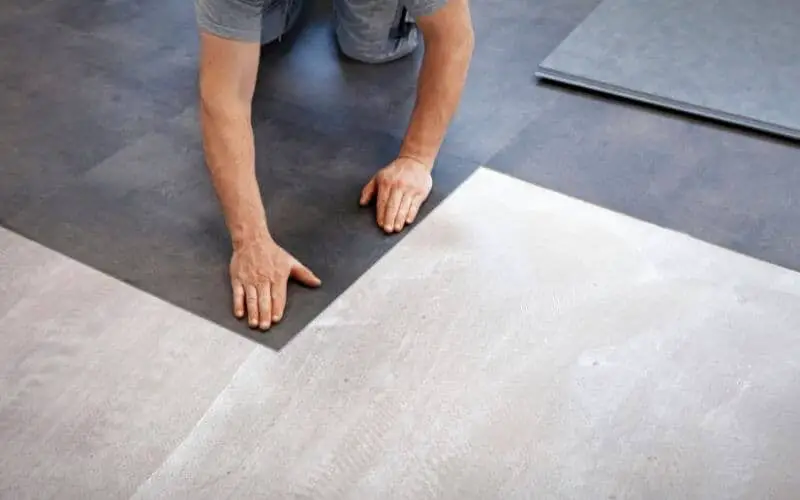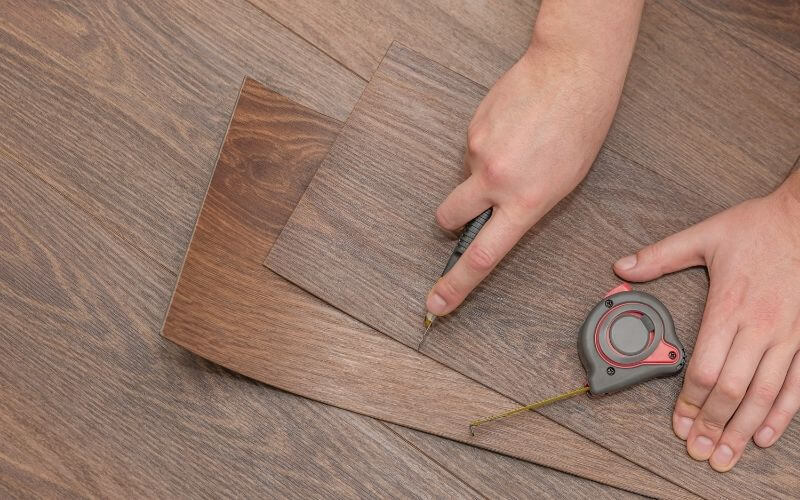Before now, most homeowners prefer to have carpets or rugs on their stairs. But then, carpets stain and wear over time which has gradually made the shift to vinyl way easier.
While vinyl is excellent for bathrooms, kitchens, and hallways, you must wonder if it is suitable for the stairs? If so, what are the advantages and disadvantages of having vinyl floorings on the stairs?
The pros of vinyl flooring on stairs involves its durability and water resistant feature, its affordability and easiness to clean isn’t also left out. The cons of vinyl flooring involves the floor being prone to scratches and being hard to remove.
When it comes to resilient floors, vinyl flooring on stairs is regarded as one of the topmost. The durable and resilient nature of vinyl has made it an all-time favorite for most homeowners.
While vinyl flooring is durable and affordable, the downside is that it is hard to remove. Now, let’s get to the pros and cons of vinyl flooring on stairs.
Related: Pros and Cons of Laminate flooring on stairs
What is Vinyl Flooring?
Table of Contents
Before we get into the pros and cons of vinyl flooring on stairs, it’s essential we find out what vinyl flooring is and what the fuss is about it.
Just like other floorings, vinyl flooring is a sheet type of flooring. But unlike other flooring tiles that are made of wood that come in separate parts, vinyl flooring is all one sheet.
Vinyl flooring is usually available to purchase in a long sheet cut to the size you require. There are various designs of vinyl flooring which can have your flight of stairs looking fantastic!
Most manufacturers produce two different styles of vinyl floors – the wooded or tiled patterns and sometimes a combination of both.
There are some considerations that vinyl flooring might not be as durable when compared to other floorings. There are also concerns about the method of disposing of vinyl flooring and its effect on the environment.
Related: What is the most durable hardwood floor?
Pros and Cons of Vinyl Flooring in Stairs
Vinyl sheet on the stairs? What do you think about that? While it is normal to have vinyl flooring in the home, it becomes another decision to have them on your flight of stairs.
It is practicable to install vinyl flooring on your stairs. It has some pros and cons, which we will discuss in length.
Pros of Vinyl flooring on stairs
Below are some of the top advantages of vinyl flooring on your flight of stairs.
1. Affordability
If you’re on a tight budget, then the affordability of vinyl floorings automatically becomes its most significant advantage.
Compared to other flooring tiles like advantage bamboo and cork, you discover that vinyl flooring is way cheaper.
Depending on the quality, vinyl flooring ranges between $2-$6 per square foot. You can also save costs by installing them by yourself.
Even if you go ahead to use a professional, the cost of hiring experts should range from about $2-$6 per square foot.
With your tight budget, you can easily obtain vinyl flooring that will give you the illusion of wooden tiles at first glance.
2. You can install it yourself
When discussing the affordable nature of vinyl flooring, remember that you can easily install it yourself if you don’t want to pay an expert for installation.
Vinyl flooring comes in a singular sheet. Thus, with a few tips from the internet, you can easily install it on your flight of stairs.
The installation method of vinyl flooring cannot be compared to tiled, laminate, or wooden flooring, which is a tad bit technical.
Unlike other types of flooring that require tools or sealing equipment, vinyl flooring comes with a sticky adhesive on the back of it. To install it, you just need to place it firmly on the floor surface, and the job is complete!
Related: How to install linoleum flooring
3. Easy to Clean
Unlike other flooring tiles like laminate floor, which can survive moisture, vinyl can be wet cleaned with no concerns. Few moments of cleaning will leave your vinyl flooring sparkling clean!
In terms of maintenance, you’re almost sure that dirt won’t be trapped between the tiles or floorboards, which will necessitate a deeper cleaning.
4. Water Resistant and Durable
Most flooring options might be water-resistant but not waterproof, which becomes one of the most significant advantages vinyl floorings has over wooden tiles. Vinyl floors can last up 20 years (depending on how it is used).
The surface layer can handle misuse and thus can resist scratches, stains, cracks, and dents, which characterizes other flooring options.
The water-resistant/waterproof nature of vinyl flooring makes it perfect for rooms with high moisture, like the bathroom, kitchen, and basement. You don’t have to worry about the growth of molds due to too much exposure to humidity.
Read: How to waterproof wooden floor
5. Top-Notch Comfort
The new trend of installing vinyl floors on the stairs might be because of how comfortable this flooring option is.
Vinyl flooring has a soft feel to it and has a shock absorber nature that makes it comfortable to walk on and stand on for a long time.
It doesn’t get too cold during winter or too hot during summer. Some vinyl floorings go as far as coming with foam backing, which improves sound transmission.
Related: How to fix squeaky stairs
Cons of Vinyl Flooring on Stairs
While we have outlined the pros to having vinyl flooring on stairs, we must acknowledge that there are some disadvantages to having it on your stairs.
1. It Is Prone to Scratches and Cuts
The downside of the cushioned-like nature of vinyl flooring is that it is not scratch-resistant. These damages are usually typical in cheaper types of vinyl flooring and also in areas of high traffic.
Fortunately, the damaged vinyl plank or tile can be removed individually and replaced. To protect your vinyl flooring from more damage, use coasters or food pads under the feet of your furniture to protect vinyl plank flooring from heavy furniture dents.
2. Dirt Particles on The Subfloor Will Show on Vinyl Flooring
While one of the pros of vinyl flooring is its ease of installation – you can easily install it yourself! However, when installing, special care must be taken to ensure that the subfloor is as flat as possible and free from any dirt or imperfection.
This is because dirt on the subfloor can appear as noticeable bumps and bubbles on the surface of the vinyl, making it look untidy.
Use appropriate vinyl flooring underlayment to prevent this from occurring.
3. Hard to Remove
Remember that we mentioned that vinyl flooring is glued down with strong adhesives; while this attribute makes it easy to install, it has its downside.
Removing vinyl flooring from the subfloor is extremely difficult; even when you’re removing it with scrapping tools and cleaners, it will still take a very long time.
4. It Is Not Environmentally Friendly
Corks and bamboo flooring will always take precedence over vinyl flooring in terms of environmental impacts and sustainability.
Vinyl flooring comprises polyvinyl chloride combined with other compounds like Plasticizers, stabilizers, pigments, and fillers, which are toxic and poisonous gases.
The gas emitted from these compounds exposes both humans and pets to the risk of asthma, cancer, kidney, lung, and other health problems.
While it is environmentally hazardous to burn vinyl flooring because of the gas it emits, the material used in its production doesn’t decay. Thus it can sit on the compost for years without decay. In addition, it is hard to recycle it.
Related: Best Vacuum Cleaner for Stairs
Conclusion
As a result of the many advantages of vinyl flooring, it has become an all-time favorite for most homeowners. The versatility, flexibility, and ease of installation have made it quite popular.
While vinyl flooring has certain cons, from all indications, it may seem that its pros outweigh its cons.
Regarding its lack of sustainability and hazard to the environment, most manufacturers are taking care to produce sustainable and environmentally friendly vinyl flooring.

